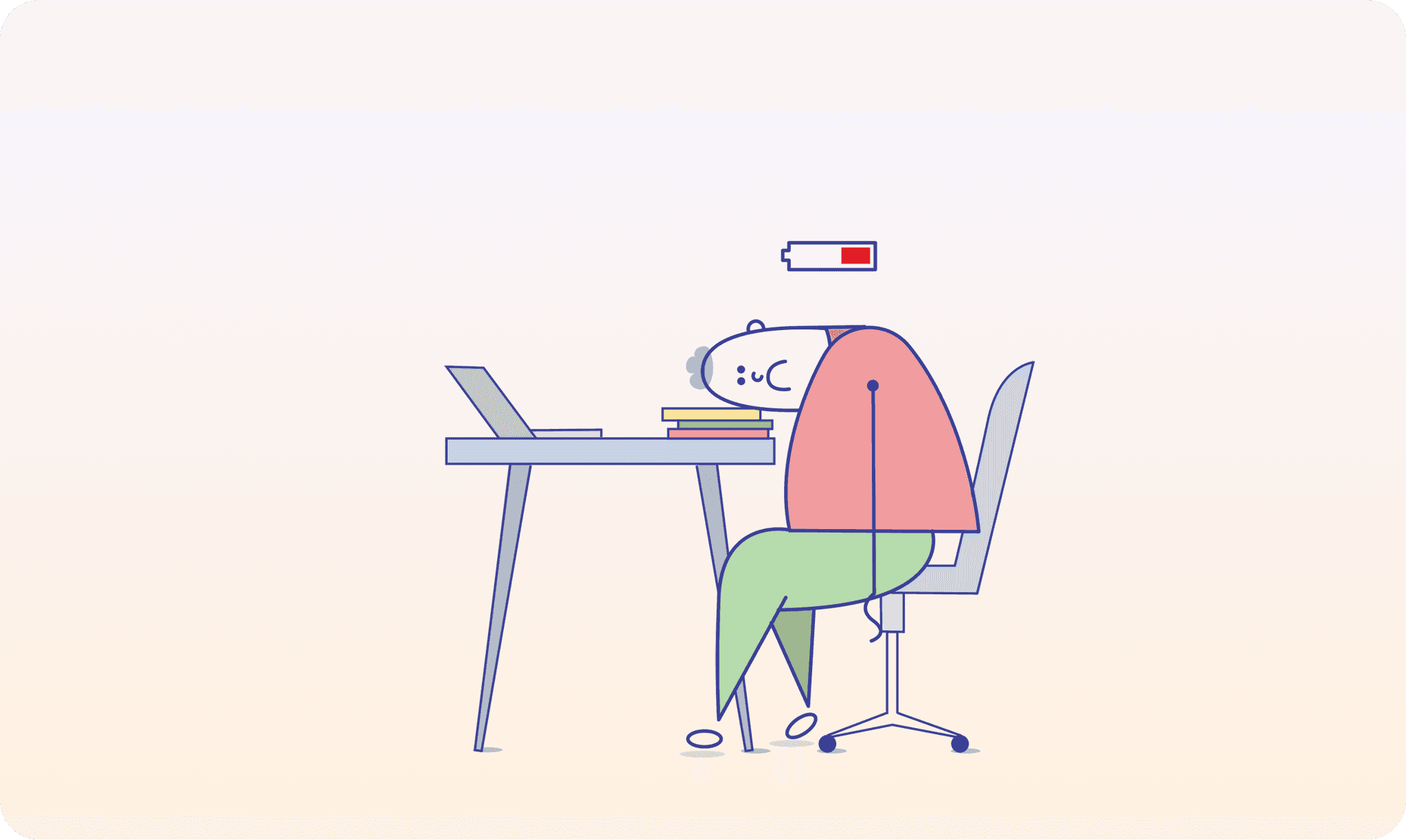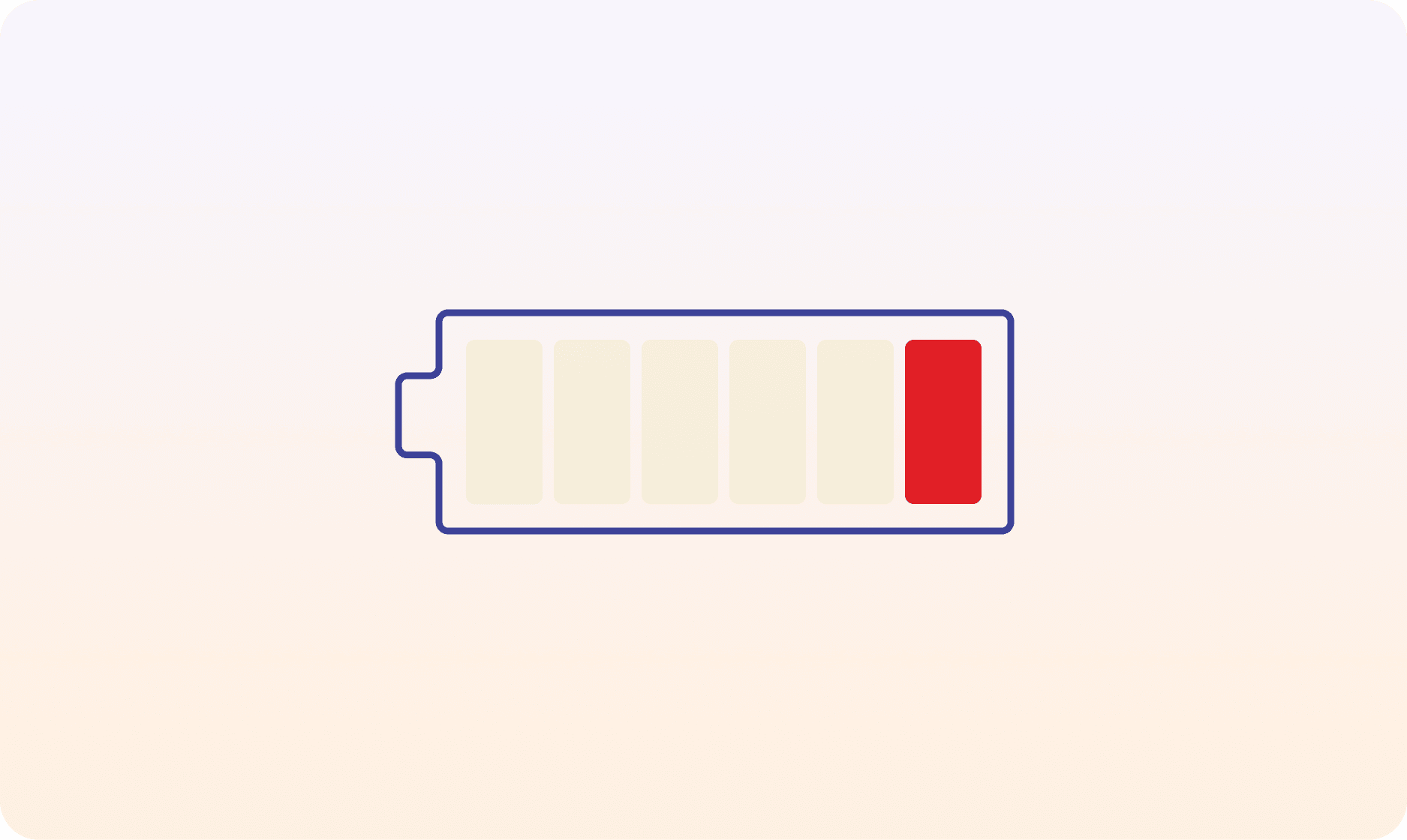How to recover from burnout: The ultimate guide
Apr 4, 2023

I didn’t get enough sleep last night. I’ve been feeling unmotivated at work. I have raging headaches. I feel anxious all the time. I feel like people are expecting too much from me. I don’t love my job anymore.
How many of those statements resonated with you? If you’ve been feeling any or all of these, you might be going through burnout.
And if you came onto this burnout test page thinking, “This is all my fault”, we’re here to tell you it’s not!
Repeat after us: Burnout happens to the best of us.
Burnout usually stems from a failure of the systems we work in every day, and subjective conditions that cause stress and resentment to pile up. It’s a state of emotional and physical exhaustion that affects every other aspect of your life, from family to social connections. But that’s not to say there’s no way to prevent it.
What are the symptoms of burnout?
Burnout is a trickster, making you pull a constant stream of motivation from up your sleeve and plays tricks on your self-esteem and perception. It happens when months of workplace stress balls up and isn’t successfully managed. It’s not an “all or nothing” thing, as there are multiple stages to burnout.
But over time, you might find yourself experiencing these symptoms:
Becoming cynical or critical at work
Feeling irritable or impatient
Lacking satisfaction from achievements
Losing the motivation to be productive
Feeling distant from your job
You might also experience physical symptoms of burnout, which include:
increased anxiety
sudden headaches without a history of migraines
disturbed sleep or a total lack of sleep
lower immunity
tension in your back, neck or shoulders
Stress vs burnout: What's the difference?
“Stress” and “burnout” are not the same. Think of Stress as the long-distance train that goes straight to Burnout Town. Stress that’s temporary or tied to a particular event or time of life is normal. But when stress is long-term and isn’t managed, then it transforms into burnout. Stress can lead to positive results, but there’s nothing positive about burnout.
So to fight the right problem, it’s essential to understand if you’re stressed or burnt out.
Alright, enough pessimism — it’s really not all doom and gloom from here.
Yes, you can kick burnout’s butt. Yes, you can prevent it from showing up on your doorstep like an unwelcome relative. And yes, you can replenish your lost energy and feel excited about your job again.
Wanna see how? Let’s jump into it, then.
Find out why you're burnt out
Hey, listen — burnout doesn’t look the same for everyone. Everyone responds differently to stressors. That makes burnout something we’ve got to deal with at an individual level.That’s why the second step in the process of recovering from burnout is finding out why you’re burnt out. Burnout can be caused by working long hours (looking at you, 60-hour weeks 👀) but we’ve got to consider a lot of other factors.
You can't find meaning at work
A lot of us are lucky enough to have jobs that we’re passionate about. In fact, that’s what gets a handful of us through gruelling hours. But when you start to feel like there’s no meaning to what you’re doing at work, you can end up moving towards burnout. If you want to start finding meaning in your work again, we can help.
You don't feel "seen"
Let’s face it: we’re all about gaining recognition at work. Getting kudos for any task, big or small, can be a huge boost of motivation. So when the opposite happens—you feel you aren’t being seen by your team or higher-ups—you might start experiencing burnout. We’re not making this up, it’s science: recognition at work can prevent burnout in the long run!
You're overworked
If we had a penny for each time we saw “hustle harder” posters in workplaces, we’d all be heading into space right about now. If you’re finding it difficult to focus at work, feel under pressure almost all the time, and laugh hysterically any time someone says “work-life balance”, you’re probably overworked. And that means you might be on your way to burnout.
Your life revolves around your job
Since the advent of lockdowns and Work From Home setups, it’s become harder to draw boundaries and disconnect from your job even when you’re off the clock. Not having much to do outside of work and being isolated is not a good combination for your mental health. The good news is that you can change all of this intentionally — and we’ve put together a guide to disconnecting from work to get you started!
How to accept burnout
When something is on fire, you think, “oh, hell, there’s a fire,” and ring the alarm. You don’t turn into that meme of the dog in a burning room saying, “this is fine”.
And yet, that’s what a lot of us do when we’re experiencing burnout. We say “this is fine” and continue drinking coffee or taking free yoga classes. All the while, the house burns down around us.
That’s because a lot of us tend to feel guilty about being burnt out, like it’s reserved only for certain jobs or industries. In fact, you’d be surprised to see how many people skate around the word “burnout” by saying everything else about it: having a bad day, not feeling it today, not as bad as [insert name] has it while working as a [insert position that seems more deserving of feeling burnt out].
One of the most important steps in recovering from burnout is to stop bottling your feelings up or delegitimising them. Burnout isn’t a badge of honour reserved only for some professions, and it’s not something you should cloak with other words.
Sure, burnout might not look like that article you read, or the experience your colleague had, or that podcast your friend recommended. But that’s a feature, not a bug — it doesn’t invalidate your experience. Accept that you are burnt out. Now let’s go ahead and do something about it.
How to recover from burnout
Identify habits that are not serving you
Spoiler: You probably do a bunch of these every day. We all do. While most causes of burnout come from work, our habits can add to the mess.
Take a sip of water for every habit on this list that makes you fidget guiltily:
Checking your email very frequently and after work
Working through your lunch hours
Cramming your calendar with meetings
Replying to messages as and when they come
Talking negatively to yourself or putting yourself down
These habits make us feel successful in the short run. But down the road, they can be quite harmful and even contribute to burnout. So take some time to work out your everyday habits and identify those not serving you.
It’ll take conscious effort to rid yourself of these habits (heck, they’re called habits for a reason), but it’ll be so worth it. Then, why not replace the sucky habits with some great ones that can stave off burnout?
Talk to your boss about burnout
There’s a lot about burnout that’s individual but, overall, it’s an organisational problem. When you’re burnt out, your motivation and productivity decrease, which means you can’t contribute your best.
Instead of sweeping symptoms under the carpet, a step forward in recovering from burnout is talking to your boss about it.
For many, there’s the feeling that you’re replaceable if you don’t put in the hours. This ties in with the aspect of “not enough”: not being enough, not doing enough, not smart enough. But suffering in silence has more brutal repercussions than being open about it.
Your boss is well-positioned to help you reduce your workload, enlist the team’s support, even give you an extended break. At a higher level, your honesty will help your boss realise what might be eating away at the team as a whole.
So how do you talk to your manager about burnout? It involves reaching out to a colleague, breaking down your responsibilities, advocating for yourself.
Strengthen your self-compassion
When your friend is really going through it, you’d calm them down, offer help, and express sympathy. Yet when it’s our turn to feel like a rattling washing machine on high speed, we rarely express compassion but jump straight to negative talk. And that won’t help when you’re burnt out, don’t you agree?
This is a little PSA for all the high achievers out there: When you’re recovering from burnout, your energy is at a minus. It’ll be a while until it reaches the level 10 that you’re usually at. That doesn’t make you weak or fragile or inept. So give yourself some extra love, care, patience and time.
From our long list of ways to strengthen your self-compassion, here are some of our favourite tips:
Give your recovery journey time and focus
Notice and reward all the effort you’re putting in, not just the outcome it brings
Step back and take a look at the system you’re in
Make time for non-work things that make you feel fulfilled
Adopt an ownership mindset, change what you can, and
Don’t feel pressured by things you can’t control
Build a workout habit
The internet talks about working out until the cows come home, so we won’t harp on about it here. But we will say that working out can help you recover from burnout a lot faster. It decreases confusion, anger and tension, and increases energy and revitalisation.
We suggest building a habit so that you get this dopamine hit every couple of days instead of just once. That’ll help you prevent burnout in the future as well. And we’ll throw in another tip: incorporating both strength training and cardio into your workout routine unlocks a higher level of protection against burnout.
And y’know what would make working out even more effective against burnout? Working out in nature. You know what to do!
Get support from a mental health professional
To quote Donkey from Shrek, cake has layers. That means many ingredients and external factors interacting to make a good (or bad) cake.
Our relationship with work is quite like that. There are many underlying situations and past experiences that shape how you deal with work and your levels of burnout. A lot of these factors can be hard to find without professional help because they’re buried deep.
If you feel like everything’s great at work but you still feel burnt out, you might want to seek support from a mental health professional. They’re trained to identify red flags that looked pretty green to you and can help you put some distance between yourself and your stressors.
Seeking help can be psychologically difficult and confusing. But any time you take to figure out how to work happily and care for yourself is time well spent.
Psst: Founders and HR people, here’s where you can support your team in their journey to burnout recovery. Workplace therapy!
Not a lot of people can afford therapy, and the process also comes with a bucketload of stigma. When you set up workplace therapy with the help of a mental health partner, you’re giving off all the right signals: that burnout is real and seeking professional help is valid. You’re also removing other roadblocks (hello, chonky therapy bills) that might’ve stopped your team from attending therapy. Teams win, organisations win, mental health wins!
Get some beauty sleep
In the face of the umpteen number of things we have to do in a day, sleeping might seem like a waste of time. Like, lying horizontally for 8 hours — what’s that about?
But sleep deprivation is one of the best predictors of work burnout, and recovering from burnout means you have a debt to pay. Even one night of sleeplessness can lead to higher levels of anxiety. So it’s no wonder long-term sleep-deprived souls see the gates of burnout a lot faster than most.
On the other hand, when you get regular and sound sleep, your creativity, mood, memory, and decision-making processes remain stable for long. Note that we said “sound”, which means it’s not just how long you’re sleeping that matters, but how well. Quality sleep can help you recover from burnout a lot faster. But you’ll benefit the most when you maintain a healthy sleeping routine even when you’re feeling your best!
Ask yourself who you are outside of work
Have you ever felt like, outside of work, you have all the personality of a spoon? Or perhaps you took a break from work but walked around the house like a zombie because you didn’t know what to do with yourself? It happens to the best of us, literally — because we’re no longer at our job, we are our job. And when you’re burnt out, working through all your feelings can feel like you’re dragging your feet through quicksand and sinking faster every day.
Psychologists call this enmeshment, where boundaries become blurred and individual identities are lost. If you’re wondering if that’s happening to you, ask yourself:
How much do you think about your job outside work hours?
If you met someone for the first time, how would you introduce yourself?
Do you have hobbies outside of work that aren’t related to your job, skills or industry?
How distressed would you feel if you had to stop working all of a sudden?
The answers will tell you everything you need to know. If you are unhealthily enmeshed with work, take a few hours to define yourself outside of work. We’d recommend writing this down or visualising it on paper. You’ll see that there are so many more facets to your personality that you probably sideline to prioritise Work You.
Do nothing, intentionally
Recovering from burnout will often call for dropping most tasks to rest your fried brain. But whoa there — this extra time isn’t free real estate. Taking on extra work because you now have “time” is a slippery slope. No matter how small or easy the task, you’re still working from a deficit when you should be taking time to fill your reserves.
When you’re recovering from burnout, you might be tempted to schedule a whirlwind holiday that’s worthy of the gram. But keep in mind that all of the planning, booking and travelling is an additional cognitive load that can frazzle your brain even more.
That’s why so many experts recommend doing absolutely nothing when you’re recovering from burnout. It’s more complicated than it sounds. But by dropping everything that’s not actively essential (yes, replying to “just one email” is not essential), you’re making room for active recovery.
The Dutch call it Niksen: to do nothing, be idle, slack off, zone out… you get the idea. It takes the concept of “idle minds are a devil’s workshop” by the scruff, throws it out the back window, and helps you reclaim your free time for, well, free.
Take some time off work
If you’re at that stage of burnout where you’re sacrificing sleep, health and alone time to get work done, it’s a sure sign that you need to get away, stat.
Taking time off gives you much-needed distance from stressors, non-stop pings and the barrage of emails. It’s like pressing the reset button, or wiping the slate clean so you get a fresh start. Taking time off can improve life satisfaction and even your physical health. So you can see how regular time off can prevent burnout, not just help in recovery!
You can take a day off work, or a week. But in both cases, what you need to ensure is that you’re fully unplugged. No sneaky replies to Slack messages, no checking calendars even to decline meeting requests (it’s the 21st century, technology like Pause can do that for you!).
When you’ve just recovered from burnout, you’ll want to take things slow when you re-enter work, right? It’s why we harp on about preparing for time off before you actually take time off. That means:
telling colleagues you’ll be unavailable
clearing your task list
handing over critical projects
setting up email auto-responders
When you do all this, you set yourself up for a smooth re-entry into work. No more sweating buckets at the thought of 500 unread emails, projects on fire, and angry colleagues.
The final word: Prevention is better than cure
It's hard to recover from burnout once it hits, and it can take a lot of time and effort to feel better again. That's why it's important to take care of yourself by managing your time, taking breaks from work, reducing stress, and practicing self-care.
When you do this, you can avoid burnout and stay healthy and happy for the long term. So, instead of waiting for burnout to happen, try to prevent it by taking care of yourself along the way!


